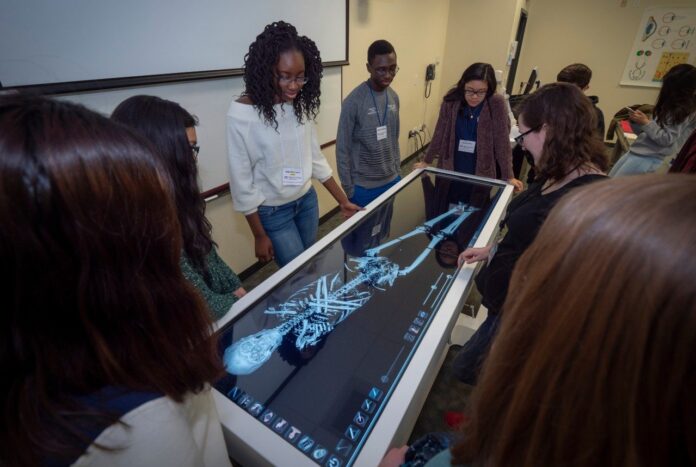What should I be doing now if I want to be a doctor? What should I major in to get into medical school? What if I’m struggling academically when I get to college?
These were some of the issues addressed last month when 36 high-potential ninth- and 10th-grade students from across the commonwealth attended the Virginia Tech Health Professions Enrichment Program (HPEP) hosted by the Virginia Tech Carilion School of Medicine. The program is an educational outreach initiative for underrepresented students who are passionate about science and health-related careers.
Started in 2018, HPEP is typically a day-long, in-person event, but this year it was adapted to be held virtually. It included a panel discussion with Jay Kyle, assistant director of the university’s Career Development and College Relations; Karen Eley Sanders, associate vice provost for college access; Azziza Bankole, the medical school’s chief diversity officer; and Angelica Witcher, VTCSOM director of student affairs, as well as discussions on cultural humility and communication, a lively game of Kahoot! to test the students’ knowledge of the medical field, and physician-patient role-playing video scenarios.
“The goal was to get young, intrigued minds who are already interested in the medical field and give them a little taste of what it’s like to be in medical school,” said Ginai Seabron, who recently received a master’s degree in higher education from Virginia Tech and served as organizer of the event.
The event showed underrepresented minority students about it takes to get into college and help them get into the mindset of doctors early on.
“It is difficult to aspire to something that you have no idea about or do not think that is a possibility because of who you are or what your circumstances are,” Bankole, who is also a Carilion Clinic psychiatrist, said. “There is power in having an example of someone who looks like you or has a similar life experience to you.”
The event’s discussion included clarification of an often-misunderstood assumption that a student must major in a science-related field if they want to go to medical school.
“A lot of them were surprised that they could major in just about any subject they want in college,” said Seabron, who was the university’s first Black woman to earn a degree in nanoscience. “They just need to make sure they take the pre-requisite courses required by medical school and talk to their advisor right away if they are falling off track academically.”
Bankole said continuing the HPEP program on a virtual platform despite the difficulties of the past year was important to the medical school.
“We had to make adjustments in the program to fit a virtual format, but in the end, it provided an opportunity to connect with high school students further out from our local geographic area,” she said. “We had a robust representation of students from the Tidewater area who might have had difficulty attending in-person. We may offer a hybrid format in the future.”

